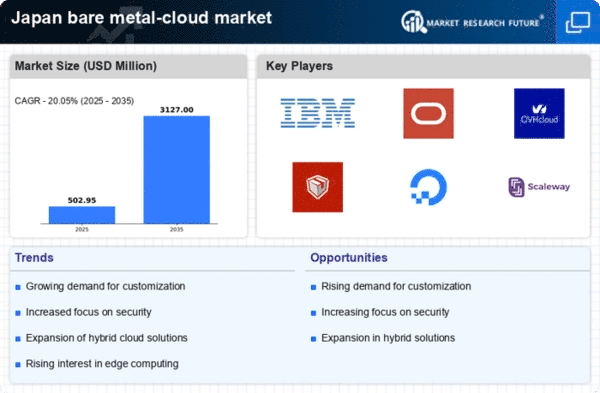Rising Cybersecurity Concerns
As cybersecurity threats continue to evolve, Japanese enterprises are increasingly prioritizing security in their IT infrastructure decisions. The bare metal-cloud market is well-positioned to address these concerns, as dedicated servers provide enhanced security features compared to shared environments. In 2025, it is estimated that 70% of organizations in Japan will consider security as a primary factor when selecting cloud solutions. This heightened focus on security is likely to drive demand for bare metal solutions, which offer isolation and control over data. Consequently, the bare metal-cloud market is expected to grow as businesses seek to mitigate risks associated with data breaches and cyberattacks, reinforcing the importance of secure infrastructure.
Emergence of Hybrid Cloud Strategies
The adoption of hybrid cloud strategies is becoming increasingly prevalent among Japanese enterprises, significantly impacting the bare metal-cloud market. Organizations are looking to combine the benefits of public and private clouds, and bare metal solutions play a crucial role in this strategy. As of 2025, it is projected that around 50% of companies in Japan will implement hybrid cloud models, necessitating the use of bare metal resources for sensitive workloads. This trend suggests that the bare metal-cloud market will experience growth as businesses seek to optimize their cloud environments while maintaining control over critical data. The flexibility offered by bare metal solutions aligns well with the hybrid approach, making it a preferred choice for many organizations.
Advancements in Network Infrastructure
The ongoing advancements in network infrastructure in Japan are significantly influencing the bare metal-cloud market. With the rollout of 5G technology and improvements in fiber-optic networks, businesses are now able to leverage high-speed connectivity for their cloud solutions. As of 2025, it is anticipated that 80% of enterprises will require high-bandwidth solutions to support their operations. The bare metal-cloud market stands to benefit from this demand, as dedicated servers can provide the necessary performance to handle increased data traffic. This trend indicates a growing reliance on bare metal solutions to optimize network performance and ensure seamless operations, further driving the growth of the market.
Growing Need for Customization and Control
In Japan, businesses are increasingly recognizing the importance of customization and control over their IT infrastructure. The bare metal-cloud market offers a unique advantage by providing dedicated hardware that can be tailored to specific workloads. This level of customization is particularly appealing to sectors such as finance and healthcare, where compliance and performance are critical. As of 2025, approximately 45% of Japanese enterprises express a preference for bare metal solutions due to their ability to meet unique operational requirements. This trend indicates a shift away from generic cloud offerings, as organizations seek more control over their environments. The demand for tailored solutions is likely to propel the growth of the bare metal-cloud market, as companies prioritize performance and security.
Increased Adoption of Cloud-Native Applications
The growing trend of cloud-native applications in Japan is driving the bare metal-cloud market. Organizations are increasingly seeking infrastructure that can support the rapid deployment and scaling of these applications. As of 2025, it is estimated that around 60% of enterprises in Japan are adopting cloud-native technologies, which necessitates robust and high-performance computing resources. The bare metal-cloud market provides the necessary performance and flexibility that traditional virtualized environments may lack. This shift towards cloud-native applications is likely to continue, as businesses aim to enhance their agility and responsiveness to market demands. Consequently, the bare metal-cloud market is positioned to benefit from this transition, as companies require dedicated resources to optimize their cloud-native strategies.
















